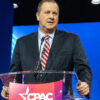As opposed to 2007, this year the planet is off to a colder than average start. Empirical evidence suggests that the planet was cooler over the past 12 months. While far from definitive evidence that global warming has been reversed – as a few hyperbolic bloggers have claimed – it is clearly worth noting. Even more so if 2008 continues as a relatively cool year, coming on top of several years of no additional warming.
The lack of coverage of the brutal winter is also strong evidence of media bias. Many news stations willingly played clips displaying massive chunks of glacial ice falling into the ocean. For awhile there were many stories about the loss of Arctic ice until recently, but now that the ice has returned to high levels thanks to a very cold Arctic winter, there is almost no coverage.
Again, extraordinary winter conditions do not suggest global warming is reversing; however, it does indicate that alarmist views should at least be questioned before policymakers implement costly legislation. The United States should learn from the European Union’s history of failure in dealing with climate change policy. The EU implemented a number of costly targets that miserably failed. Instead of creating such targets, the United States should push for market-oriented solutions For instance, the Asian Pacific Partnership on Clean Development & Climate is an innovative, voluntary approach to address climate change. The seven-country partnership, including India and China, will work with the private sector to develop cleaner technology.
Legislative proposals in the United States will undoubtedly be costly. Whether or not these costs are worthwhile will be the key question in the upcoming debate over climate-change legislation.























